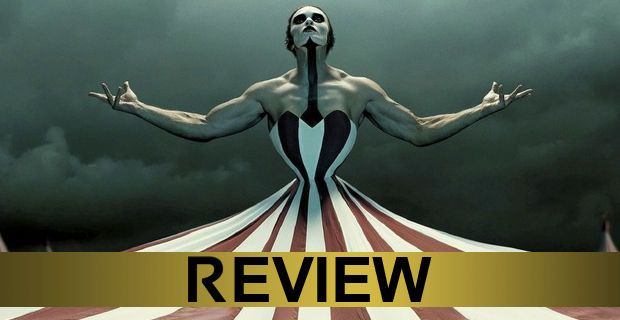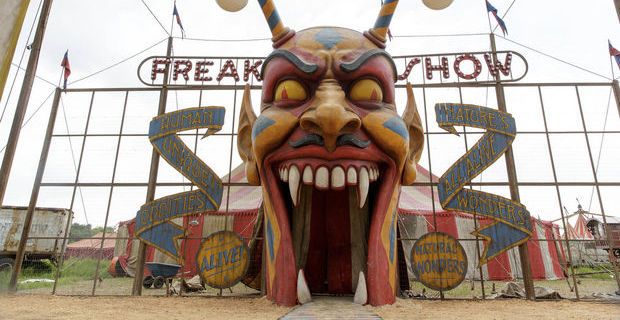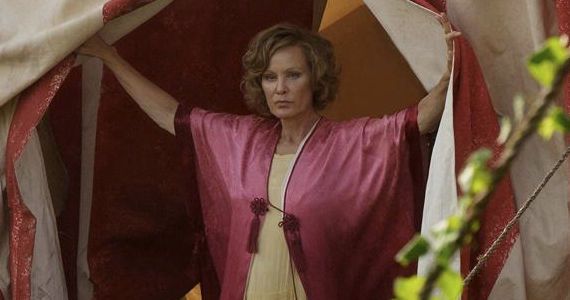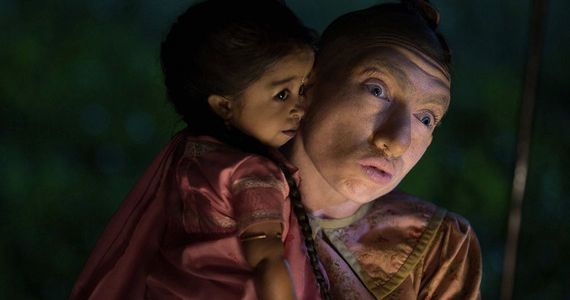[This is a review of American Horror Story: Freak Show episode 1. There will be SPOILERS.]
-
If the thought of Ryan Murphy and Brad Falchuk's brand of "Yes, let's try that," throw-everything-at-the-wall-and-see-what-sticks television being applied to a 1950s carnival sideshow (in Florida no less) inspires a certain amount of terror in you, then American Horror Story: Freak Show has likely already secured, at the very least, the attention of many a viewer. After all, fan of the show or not, who isn't going to be a little curious whether or not the series can top the tacky madness of Murder Santa or eyeballs being scooped out with a melon baller?
For the last three seasons, American Horror Story has, on one hand, assumed the mantle of the television equivalent of the id – or the purveyor of storylines woven into what would be deemed the most basic of desires. On the other hand, the show has found and dealt with threads relating to more socially conscious aspects, and although it has delivered its commentary on most of those without a hint of subtlety or nuance, that bluntness has arguably become one of the show's selling points.
With the Freak Show premiere, 'Monsters Among Us,' Murphy and Falchuk endeavor to use the displacement of entering another era to better suit the larger needs of their story. As they did in Asylum, the pair have grounded the story's theme (in the premiere at least) in a notion that feels very relevant to the here and now, but set 62 years in the past. And again, as they did in Asylum, that theme isn't necessarily examined through the lens of, say, America circa 1952; rather the time period is used to magnify the present-day points the series would like to touch on.
Oh, and there's a killer clown.
So far, what the clown has to do with anything – other than fulfilling the titular horror quotient – is anyone's guess, but he does provide a terrifying B-plot to the structurally familiar tale of a sideshow run by the German-accented Elsa Mars (Jessica Lange). That attraction is struggling to compete against newfangled sources of entertainment, and the public's bizarre love/hate relationship with the sideshow performers. The performers include Kathy Bates as the bearded lady, Ethel Darling, Evan Peters as her son, Jimmy Darling – a.k.a. the Flipper Boy – as well as various other characters, played by Jyoti Kisange Amge, the world's smallest woman, and Erika Ervin, portraying Amazon Eve.
Theirs is an interesting existence, living on the outskirts of town, unaccepted wherever they go, and yet (meagerly) compensated for being gawked at. Still, the enterprise as a whole is failing, at least until Mars comes across conjoined twins Dot and Bette Tattler (played by Sarah Paulson), after they are discovered following an investigation into their mother's murder. After much coaxing (and the threat of prosecution), the twins agree to join Mars and her sideshow, potentially discovering acceptance for the first time in their lives.
The notion of individuals being judged unfairly, being ridiculed or persecuted simply because they're different, and subsequently forced to inhabit the fringes of society is nothing new for the show. In fact, Freak Show essentially shares the same philosophy as last season's Coven, but it serves a different purpose. As last season was meant to be a celebration of womanhood, feminism, and individuality, Freak Show is much more about the way society consumes celebrity of all kinds. Moreover, it's about the expectation that because audiences pay money to see an individual perform, there is, on some level, a deeply frightening expectation of ownership that comes with the price of admission.
The latter is certainly made clear during Finn Whitrock and Frances Conroy's characters' (Dandy and Gloria Mott, respectively) visit to the sideshow, wherein they fail to negotiate a purchase price for Bette and Dot. But interestingly enough, the notion of celebrity is examined not merely to comment on the public's insatiable appetite and consumptive ferocity for all things celebrity, but also in the way many people crave fame, as the farther they drift from it, the more they convince themselves they are deserving of it. It's like a drug they've never experienced the pure form of, only some massively diluted version offering only the slightest hint of a high, making the expectations of - and desire for - the real thing all the more infeasible.
From everything that 'Monsters Among Us' aims to provide, the commodification of celebrity is the one that resonates most powerfully, which, to no one's surprise, is largely due to Lange's performance. Here, she's asked to do a wonderfully awful rendition of David Bowie's 'Life on Mars?', before revealing the selfish, fame-craving monster lurking deep within herself. Lange is ostensibly playing the same character that we've seen before on American Horror Story, and while it's comforting to see her take the lead once again, her decision to step away from the series at the end of the season is probably the right one.
Right now, the biggest compliment that you can give Freak Show is that its characters are vivid, even if their purpose and direction seem somewhat opaque. The premiere certainly has a tremendous amount of energy, but it's hard to tell whether or not the narrative will provide an appropriate outlet to release that energy or if it will wind up scattered and squandered like certain AHS stories of the past.
American Horror Story: Freak Show continues next Wednesday with 'Massacres and Matinees' @10pm on FX.
Photos: Michele K. Short/FX




